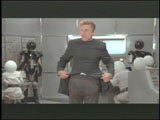I thought some of you might be interested in this.
http://news.yahoo.com/scientists-create-working-transistor-single-atom-015157683.html
What do you forsee as being possible future uses of such small powerful computers? I read not long ago that the ability to "transport matter" as in "beam me up Scottie" would require such computers. The computer has to know exactly how to arrange each atom and each molecule inorder to re-create the original. Any volunteers to be the first human to take that journey?
As long as other things make it through fine, I'm down.
Then again, a career as a stuntman or test pilot excite me, too.

RossD
SuperDork
2/20/12 8:12 a.m.
Does that mean power consumption will be way less then? A portable computing device with enough battery capacity to essentially never need to be recharged would be earth-shattering; say a 20 year charge for your laptop or cell phone.
the first person through will probably wind up silly looking, dead, or both.. but there is always the chance that when combined with a pair of rubberbands and a liquid lunch, you would wind up immortal
I'm just going to take this chance to point out that in the movie Alien, they were using DOS and Star Trek used flip phones, therefore the only way to survive in the future is to technologically recess.

RossD
SuperDork
2/20/12 8:55 a.m.
And Star Trek: The next generation used bluetooth headsets pinned to their shirts.
In reply to RossD:
I know I said it before, but the captain had an android.

I fear that it may be used for evil, not good.
I'll wait until Admiral Archers beagle reappears.
Graefin10 wrote:
I thought some of you might be interested in this.
http://news.yahoo.com/scientists-create-working-transistor-single-atom-015157683.html
What do you forsee as being possible future uses of such small powerful computers? I read not long ago that the ability to "transport matter" as in "beam me up Scottie" would require such computers. The computer has to know exactly how to arrange each atom and each molecule inorder to re-create the original. Any volunteers to be the first human to take that journey?
Transporter style devices will never happen. The Heisenberg Uncertainty Principle states that you can never know the exact position or velocity of a particle. The harder you, the less precise your measurements will be. Since, to be reassembled, a computer would need to know the entirety of a particles information (location, velocity, spin, etc) we will never be able to recreate the original object.
Although I'll agree on the validity of your arguement, doesn't Heisenberg actually imply you can either know the particle's velocity OR the location, but not both at the same time (accurately anyway)?
In reply to gimpstang:
And a theorist has never been wrong?
Heisenberg also believed that subatomic particles were particles and therefore he was only concerned with velocity and position. We know now that subatomic particles are actually probability functions and there is more to them than just those two characteristics.
We have hundreds and hundreds of experiments and mathematical models that support Heisenberg's principle. It forms the underlying basis of galaxy and start formation as well as all of Hawking's work regarding Black Holes and Hawking radiation. If Heisenberg is incorrect (or even a little incorrect), theoretical physics is going to go bonkers and a lot of nerds are going to do a lot of yelling. :)
Interesting. As a chemist, my depth in quantum physics is....well, not much. When you say we now know that subatomic particles are actually probability functions - is that a result of Heisenberg's work to define them as such? Meaning, if Heisenberg had never postulated the Uncertainty Principle, would someone have eventually decided, oh, look, we'll define them as a probability function? It seems circular to me.
Armchair quantum physics on an automotive board, gotta love it! I'll see your benchracing and raise you scientific thought experiments! Ha!
Graefin10 wrote:
I read not long ago that the ability to "transport matter" as in "beam me up Scottie" would require such computers. The computer has to know exactly how to arrange each atom and each molecule inorder to re-create the original. Any volunteers to be the first human to take that journey?
No thanks. Remember the transporter accident in Galaxy Quest?

ultraclyde wrote:
Interesting. As a chemist, my depth in quantum physics is....well, not much. When you say we now know that subatomic particles are actually probability functions - is that a result of Heisenberg's work to define them as such? Meaning, if Heisenberg had never postulated the Uncertainty Principle, would someone have eventually decided, oh, look, we'll define them as a probability function? It seems circular to me.
Armchair quantum physics on an automotive board, gotta love it! I'll see your benchracing and raise you scientific thought experiments! Ha!
I am no quantum physicist either but I do tend to follow scientific advancements in the field because I find it fascinating. From what I am remember, Heisenberg's idea was a very important contribution to the development of modern understanding of subatomic physics. I don't think he proposed the concept of probability functions but his work was used to develop the mathematical models that went into calculating particle probabilities. Heisenberg presented his ideas during a surge in physics in the late 1800's and early 1900's (I think he was in the early 1920's). I would think that someone else would have had the idea of uncertainty if Heisenberg didn't come up with it, but who is to say how long it would have taken. Suffice to say, every time a bar code is scanned, it is more supporting evidence to Heisenberg's concept.
Benchracing? We can do benchracing! My probability waveform is more statistically significant (alpha = 0.05) than your probability waveform!
caution: nerd jokes :)
Duh, Heisenberg compensator!


















































